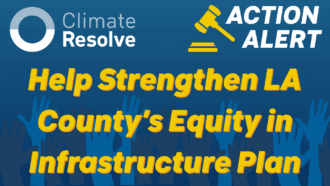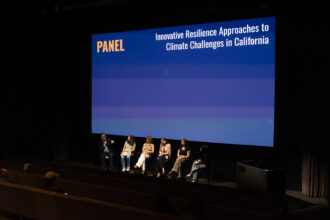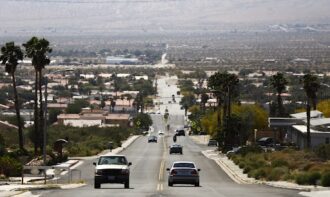In honor of last week’s Cesar Chavez Day holiday, we reached out to Climate Resolve Board Member, Victor Griego, a longtime community and labor organizer who worked with Chavez, to talk about the impact of Cesar Chavez’s legacy as an organizer and the lessons that we can apply to our fight for just climate solutions.
This interview of Victor Griego, President and Founder of Diverse Strategies for Organizing, Inc. and a Climate Resolve Board of Director, was conducted by Climate Resolve’s Communications Manager Armin Mahramzadeh.
Armin: What can climate organizers and the climate movement learn from Cesar Chavez and how he was able to create change?
Victor: Well, I think one of the things that I certainly learned from Cesar was, it’s not so much the cause, or the subject matter that keeps people going every day in any type of struggle, but it’s the people, it’s understanding that the work we do is affecting people’s lives. And that’s more important than the subject matter. So when we look at climate challenges, we look at how they impact children, how they impact older adults, how they impact people of color, disadvantaged communities? What are the faces? What are the people? And I think if we keep that front and center, that puts the energy into our work.
Armin: In what ways do workers rights and the effects of climate change intersect?
Victor: Well, hotter days, for example, impact farmworkers tremendously. And so when we look at the lack of proper health conditions for workers, either in the fields, in factories, wherever there’s increase in temperature, that’s a clear and simple visible impact of climate change on workers, just the heat, number one. Number two, climate change has impacted the cost of a lot of everyday services, and particularly low wage workers are impacted the most proportionately in terms of their wages and how they have to pay for services due to climate change. And an example of that is water and the lack of rain and snowpack impacts the type of water people are receiving. When temperature rises, surface water is impacted because of the contamination that comes from increased temperatures. So climate change impacts workers on a day-to-day basis. Now if you got money, sure, you could pay more money for your water bill, you can buy bottled water, you could pay expenses that increase because of the climate. But if you’re on the margin, it’s going to impact your quality of life tremendously.
Armin: How much is the fight for workers rights and conditions also a climate issue and vice versa?
Victor: Well, I think both of them are connected by one word, and that’s justice. Cesar, at the core of his work, was basically seeking justice. We could look at the topics of work environment, wages, health insurance, whatever the issue might be to the contract that they were trying to get from the growers. But at the end of the day it was respect and justice. And so when you look at climate, and the impacts that climate has on disadvantaged communities, on older adults, it’s about justice.




